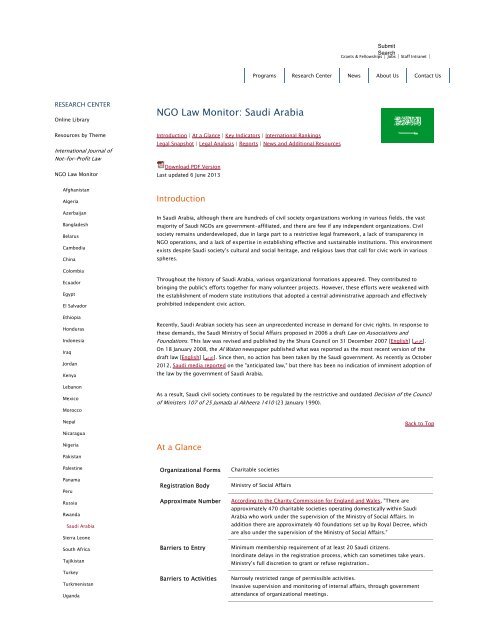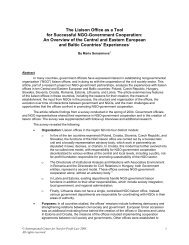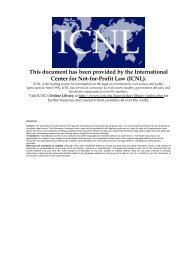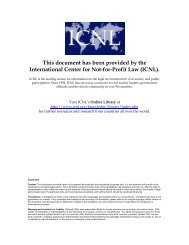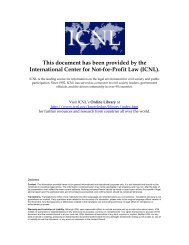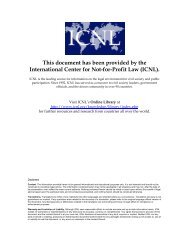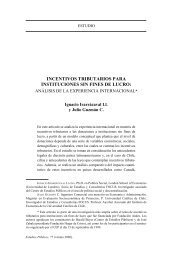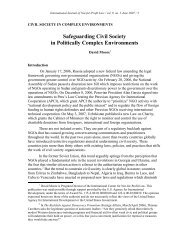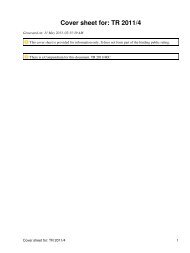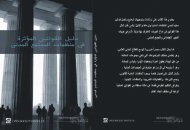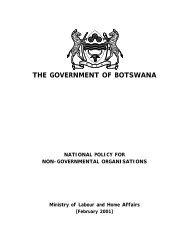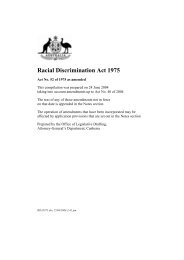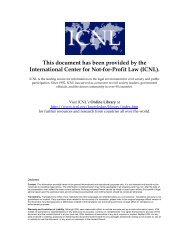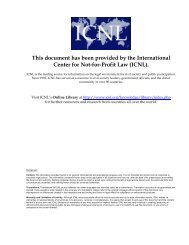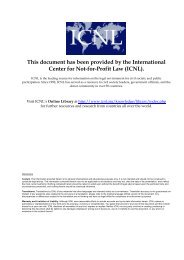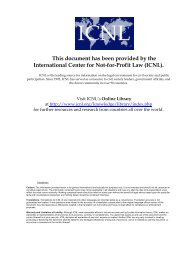Saudi Arabia - NGO Law Monitor - Research Center - ICNL - The ...
Saudi Arabia - NGO Law Monitor - Research Center - ICNL - The ...
Saudi Arabia - NGO Law Monitor - Research Center - ICNL - The ...
Create successful ePaper yourself
Turn your PDF publications into a flip-book with our unique Google optimized e-Paper software.
Submit<br />
Search<br />
Grants & Fellowships | Jobs | Staff Intranet |<br />
Programs <strong>Research</strong> <strong>Center</strong> News About Us Contact Us<br />
RESEARCH CENTER<br />
Online Library<br />
<strong>NGO</strong> <strong>Law</strong> <strong>Monitor</strong>: <strong>Saudi</strong> <strong>Arabia</strong><br />
Resources by <strong>The</strong>me<br />
International Journal of<br />
Not-for-Profit <strong>Law</strong><br />
<strong>NGO</strong> <strong>Law</strong> <strong>Monitor</strong><br />
Introduction | At a Glance | Key Indicators | International Rankings<br />
Legal Snapshot | Legal Analysis | Reports | News and Additional Resources<br />
Download PDF Version<br />
Last updated 6 June 2013<br />
Afghanistan<br />
Algeria<br />
Azerbaijan<br />
Bangladesh<br />
Belarus<br />
Cambodia<br />
China<br />
Colombia<br />
Ecuador<br />
Egypt<br />
El Salvador<br />
Ethiopia<br />
Honduras<br />
Indonesia<br />
Iraq<br />
Jordan<br />
Kenya<br />
Lebanon<br />
Mexico<br />
Morocco<br />
Nepal<br />
Introduction<br />
In <strong>Saudi</strong> <strong>Arabia</strong>, although there are hundreds of civil society organizations working in various fields, the vast<br />
majority of <strong>Saudi</strong> <strong>NGO</strong>s are government-affiliated, and there are few if any independent organizations. Civil<br />
society remains underdeveloped, due in large part to a restrictive legal framework, a lack of transparency in<br />
<strong>NGO</strong> operations, and a lack of expertise in establishing effective and sustainable institutions. This environment<br />
exists despite <strong>Saudi</strong> society’s cultural and social heritage, and religious laws that call for civic work in various<br />
spheres.<br />
Throughout the history of <strong>Saudi</strong> <strong>Arabia</strong>, various organizational formations appeared. <strong>The</strong>y contributed to<br />
bringing the public's efforts together for many volunteer projects. However, these efforts were weakened with<br />
the establishment of modern state institutions that adopted a central administrative approach and effectively<br />
prohibited independent civic action.<br />
Recently, <strong>Saudi</strong> <strong>Arabia</strong>n society has seen an unprecedented increase in demand for civic rights. In response to<br />
these demands, the <strong>Saudi</strong> Ministry of Social Affairs proposed in 2006 a draft <strong>Law</strong> on Associations and<br />
.[عربي] [English] Foundations. This law was revised and published by the Shura Council on 31 December 2007<br />
On 18 January 2008, the Al Watan newspaper published what was reported as the most recent version of the<br />
draft law [English] .[عربي] Since then, no action has been taken by the <strong>Saudi</strong> government. As recently as October<br />
2012, <strong>Saudi</strong> media reported on the "anticipated law," but there has been no indication of imminent adoption of<br />
the law by the government of <strong>Saudi</strong> <strong>Arabia</strong>.<br />
As a result, <strong>Saudi</strong> civil society continues to be regulated by the restrictive and outdated Decision of the Council<br />
of Ministers 107 of 25 Jumada al Akheera 1410 (23 January 1990).<br />
Back to Top<br />
Nicaragua<br />
Nigeria<br />
Pakistan<br />
Palestine<br />
Panama<br />
Peru<br />
Russia<br />
Rwanda<br />
<strong>Saudi</strong> <strong>Arabia</strong><br />
Sierra Leone<br />
South Africa<br />
Tajikistan<br />
Turkey<br />
Turkmenistan<br />
Uganda<br />
At a Glance<br />
Organizational Forms<br />
Registration Body<br />
Approximate Number<br />
Barriers to Entry<br />
Barriers to Activities<br />
Charitable societies<br />
Ministry of Social Affairs<br />
According to the Charity Commission for England and Wales, "<strong>The</strong>re are<br />
approximately 470 charitable societies operating domestically within <strong>Saudi</strong><br />
<strong>Arabia</strong> who work under the supervision of the Ministry of Social Affairs. In<br />
addition there are approximately 40 foundations set up by Royal Decree, which<br />
are also under the supervision of the Ministry of Social Affairs."<br />
Minimum membership requirement of at least 20 <strong>Saudi</strong> citizens.<br />
Inordinate delays in the registration process, which can sometimes take years.<br />
Ministry’s full discretion to grant or refuse registration..<br />
Narrowly restricted range of permissible activities.<br />
Invasive supervision and monitoring of internal affairs, through government<br />
attendance of organizational meetings.
Back to Top<br />
Key Indicators<br />
Population<br />
26,534,504 (July 2012 est.)<br />
Capital<br />
Riyadh<br />
Type of Government<br />
Monarchy<br />
Life Expectancy at<br />
Birth<br />
Male: 72.37 years<br />
Female: 76.42 years (2012 est.)<br />
Literacy Rate Male: 90.4%<br />
Female: 81.3% (2010 est.)<br />
Religious Groups Muslim (official): 100%<br />
Ethnic Groups Arab: 90%; Afro-Asian: 10%.<br />
GDP Per Capita<br />
$24,400 (2011 est.)<br />
Source: <strong>The</strong> World Factbook. Washington, DC: Central Intelligence Agency, 2013.<br />
Back to Top<br />
International Rankings<br />
Ranking Body Rank Ranking Scale<br />
(best - worst<br />
possible)<br />
UN Human Development Index 56 (2011) 1 – 182<br />
World Bank Rule of <strong>Law</strong> Index 56.8 (2011) 100 – 0<br />
World Bank Voice & Accountability Index 3.3 (2011) 100 – 0<br />
Transparency International 66 (2012) 1 – 180<br />
Freedom House: Freedom in the World<br />
Status: Not Free<br />
Political Rights: 7<br />
Civil Liberties: 7 (2012)<br />
Free/Partly Free/Not<br />
Free<br />
1 – 7<br />
1 – 7<br />
Foreign Policy: Failed States Index Rank: 100 (2012) 177 – 1<br />
Back to Top<br />
Legal Snapshot<br />
International and Regional Human Rights Agreements<br />
Key International Agreements Ratification* Year<br />
International Covenant on Civil and Political Rights (ICCPR) No --<br />
Optional Protocol to ICCPR (ICCPR-OP1) No --<br />
International Covenant on Economic, Social, and Cultural Rights (ICESCR) No --<br />
Optional Protocol to ICESCR (OP-ICESCR) No --<br />
International Convention on the Elimination of All Forms of Racial<br />
Discrimination (ICERD)<br />
Yes 1997
Convention on the Elimination of All Forms of Discrimination Against<br />
Women (CEDAW)<br />
Yes 2000<br />
Optional Protocol to the Convention on the Elimination of Discrimination<br />
Against Women<br />
No --<br />
Convention on the Rights of the Child (CRC) Yes 1996<br />
International Convention on the Protection of the Rights of All Migrant<br />
Workers and Members of their Families (ICRMW)<br />
No --<br />
Convention on the Rights of Persons with Disabilities (CRPD) Yes 2008<br />
Key Regional Agreements Ratification* Year<br />
Arab Charter on Human Rights Yes 2009<br />
* Category includes ratification, accession, or succession to the treaty<br />
Constitutional Framework<br />
<strong>The</strong> <strong>Saudi</strong> Constitution was adopted in 1992 by Royal Decree of King Fahd. Notably, there are no constitutional<br />
provisions that support the freedom of association or assembly, or the formation of associations. Article 26 of<br />
the <strong>Saudi</strong> Constitution does, however, require that "the state shall protect human rights according to Islamic<br />
law."<br />
National <strong>Law</strong>s and Regulations Affecting Sector<br />
<strong>The</strong>re are many regulations related to civil society organizations in <strong>Saudi</strong> <strong>Arabia</strong>. <strong>The</strong>se regulations govern<br />
charitable institutions, labor committees and cooperative societies. <strong>The</strong> most prominent are the following:<br />
Decision of the Council of Ministers 107 of 25 Jumada al Akheera 1410 (23 January 1990), which<br />
governs charitable societies and institutions and addresses establishment requirements;<br />
registration requirements; internal governance; termination; and administration.<br />
Regulations relating to a wide variety of specific organizations including the National Commission<br />
for Elderly, the National Commission for Childhood, Human Rights Commission, Handicapped<br />
Rehabilitation Programs, National Commission for the Welfare of Prisoners, Nurseries and Social<br />
Welfare Foundations, Girls Welfare and Vocational Rehabilitation Programs for the Handicapped.<br />
A license from the Ministry of Labor is required to form a worker’s committee in any private sector<br />
company. All formal and informal workers’ committees are monitored by the Ministry of Labor.<br />
Pending <strong>NGO</strong> Legislative / Regulatory Initiatives<br />
A panel of experts in the <strong>Saudi</strong> Cabinet is reportedly reviewing the draft <strong>NGO</strong> law which was first submitted by<br />
the Ministry of Social Affairs in 2006 and published by the Shura Council in 2007 [English] ,[عربي] and appears<br />
to have been amended by the Council of Ministers in 2008 [English] .[عربي] According to one lawyer in <strong>Saudi</strong><br />
<strong>Arabia</strong>, the draft law "will streamline efforts, benefit groups currently under the supervision of multiple<br />
authorities, unify these groups' demands, define their functional scope and contribute to their development."<br />
While draft legislation represents a significant step in the formal recognition of <strong>NGO</strong>s as development partners<br />
with the state and the people of <strong>Saudi</strong> <strong>Arabia</strong>, as well as codification of their status as legal persons in the<br />
Kingdom, previous draft laws have not been so closely aligned with good international practices. Notable<br />
among the issues of previous draft laws is the propensity to provide a general rule or guidance, but defer<br />
precision in executing such guidance to regulatory action to be taken by a ministry or (usually) the National<br />
Authority for Associations and Foundations. Such discretion is often extremely broad, even with general<br />
statutory guidance.<br />
Back to Top<br />
Legal Analysis<br />
Organizational Forms<br />
Civil society organizations in <strong>Saudi</strong> <strong>Arabia</strong> can be registered as either a "charitable society" or a "charitable<br />
foundation." Charitable societies and foundations carry out charitable and voluntary work, including helping the
poor, improving residences, providing financial aid to needy people; preparing youth for the labor market<br />
through training programs and coordination with employers; and providing healthcare, educational and social<br />
services. All of these organizations are governed by Decision of the Council of Ministers 107 of 25 Jumada al<br />
Akheera 1410 , and are supervised by the Ministry of Social Affairs in terms of registration procedures,<br />
monitoring the elections of the board of directors, financial accounts and their activities and programs.<br />
Charitable societies also receive annual financial support from the Ministry, depending on the budget size of<br />
each society.<br />
Public Benefit Status<br />
<strong>The</strong>re is no law or regulation that distinguishes public benefit organizations from other organizations.<br />
Barriers to Entry<br />
<strong>The</strong>re are multiple barriers to the formation and existence of civil society organizations:<br />
To be registered, organizations are obligated to have at least twenty founding members who must<br />
be <strong>Saudi</strong> citizens.<br />
<strong>The</strong> registration process may be protracted, and sometimes takes years; unsuccessful applicants<br />
are not provided rational justifications for the registration delays.<br />
An organization’s field of work must be approved by the Ministry of Social Affairs, and its<br />
geographical work zones must not overlap with other societies or institutions.<br />
<strong>The</strong> Minister has the right to grant or refuse registration based on the Minister's full discretion.<br />
Barriers to Operational Activity<br />
First, an <strong>NGO</strong>’s activities are strictly confined to those which were approved during the registration process,<br />
and the range of permissible activities is narrowly construed. A <strong>NGO</strong> must obtain prior approval from the<br />
Ministry of Social Affairs before undertaking additional activities. Moreover, the Ministry of Social Affairs and<br />
intelligence authorities strictly monitor the activities of <strong>NGO</strong>s; if an <strong>NGO</strong> engages in unapproved activities, then<br />
government authorities compel the founders of the organization to sign pledges to discontinue these activities.<br />
Second, the law allows the state to intervene in the internal affairs of organizations. For example,<br />
representatives of various official agencies monitor most meetings held by societies. Indeed, governmental<br />
representatives attending general meetings may also approve resolutions.<br />
Barriers to Speech / Advocacy<br />
Advocacy organizations are prohibited. <strong>The</strong> only legal organizational form for civil society is the charity or<br />
missionary organization – and the permissible purposes which they can pursue are narrowly defined.<br />
Allegedly, a draft anti-terrorism law - the Draft Penal <strong>Law</strong> for Terrorism Crimes and Financing of Terrorism – is<br />
being prepared, which would allow the authorities to prosecute peaceful dissent with harsh penalties as a<br />
"terrorist crime." Under the draft law, the definition of terrorist crimes is so broad that legitimate dissent would,<br />
in effect, be criminalized. Questioning the integrity of the King or the Crown Prince would carry a minimum<br />
prison sentence of 10 years.<br />
Barriers to International Contact<br />
<strong>NGO</strong>s must obtain prior approval from the Ministry before communicating with regional and international peer<br />
groups. Foreign organizations are prohibited from opening branches in <strong>Saudi</strong> <strong>Arabia</strong>.<br />
Barriers to Resources<br />
Although there are no specific rules or regulations that address the receipt of funds from abroad, it is known<br />
that <strong>Saudi</strong> <strong>NGO</strong>s are prevented, in practice, from receiving any foreign funding.<br />
Domestic funding is limited to cash donations from <strong>Saudi</strong>s. In recent years, the government has instituted a<br />
plan that includes many restraints and procedures for monitoring <strong>NGO</strong> fundraising in an effort to impede<br />
groups who support terrorist activities.<br />
Many organizations and institutions carry out investment projects to increase their incomes although there are
several restrictions that limit speculation or getting involved in high risk investments.<br />
Back to Top<br />
Reports<br />
UN Universal Periodic Review Reports Universal Periodic Review: <strong>Saudi</strong> <strong>Arabia</strong> (2009)<br />
Reports of UN Special Rapporteurs<br />
<strong>Saudi</strong> <strong>Arabia</strong><br />
USIG (United States International<br />
Grantmaking) Country Notes<br />
U.S. State Department<br />
Failed States Index Reports<br />
IMF Country Reports<br />
International Commission of Jurists<br />
Not available<br />
2010 Country Reports on Human Rights Practices: <strong>Saudi</strong><br />
<strong>Arabia</strong><br />
Advancing Freedom and Democracy Reports, 2010: <strong>Saudi</strong><br />
<strong>Arabia</strong><br />
2012 Foreign Policy Failed States Index<br />
<strong>Saudi</strong> <strong>Arabia</strong> and the IMF<br />
Not available<br />
International <strong>Center</strong> for Not-for-<br />
Profit <strong>Law</strong> Online Library<br />
<strong>Saudi</strong> <strong>Arabia</strong><br />
Back to Top<br />
News and Additional Resources<br />
While we aim to maintain information that is as current as possible, we realize that situations can rapidly<br />
change. If you are aware of any additional information or inaccuracies on this page, please keep us informed;<br />
write to <strong>ICNL</strong> at ngomonitor@icnl.org.<br />
CIVICUS highlights escalating crackdown on civil society in <strong>Saudi</strong> <strong>Arabia</strong> (May 2013)<br />
<strong>The</strong> <strong>Saudi</strong> government is resorting to a systematic crackdown on critical voices through the denial of<br />
registration to human rights groups, imposition of travel bans on activists and intimidation of human rights<br />
defenders through politically motivated legal proceedings. CIVICUS urges the Government of <strong>Saudi</strong> <strong>Arabia</strong> to<br />
take all necessary measures to ensure the creation of a safe and enabling environment for civil society groups<br />
in the country. At a minimum, the <strong>Saudi</strong> Government must (i) allow space for the registration of independent<br />
human rights groups; (ii) remove arbitrary travel bans on pro-democracy activists; and (iii) immediately and<br />
unconditionally release all civil society activists, including Dr. Abdullah Al-Hamid and Dr. Mohammed<br />
Al-Qahtani.<br />
Social Affairs Justifies Refusal to Register "Adalah": Objectives "Contrary to the System" (January 2013)<br />
<strong>Law</strong>yers for the Ministry of Social Affairs respond to a lawsuit seeking registration from the Adala <strong>Center</strong> for<br />
Human Rights by telling the court that "the principle of the rule of law, which is one of the objectives of the<br />
Adalah center, is contrary to the regulations of the country and the Islamic Sharia."<br />
<strong>Saudi</strong> <strong>Arabia</strong> Prosecuting Peaceful Protesters (October 2012)<br />
On October 17, 2012, the Bureau of Investigation and Prosecution charged 19 men with “instigating chaos and<br />
sedition” and “gathering illegally” after they participated in a peaceful protest on September 23 outside Turfiya<br />
prison, in Qassim province in central <strong>Saudi</strong> <strong>Arabia</strong>. <strong>The</strong>y were seeking the release of family members, some of<br />
whom have been held for years without charge. On October 18, a criminal court sentenced 15 of the men to<br />
between 3 and 15 days in prison, along with suspended sentences of between 50 and 90 lashes and suspended<br />
jail terms of between two and five months. <strong>The</strong> trial of the remaining four is scheduled for November 4.<br />
“Instead of addressing the protesters’ concerns, the <strong>Saudi</strong> government has used the judicial system to punish<br />
them,” said Joe Stork, deputy Middle East director at Human Rights Watch.<br />
<strong>Saudi</strong> <strong>Arabia</strong> Shura Council amends draft law on civil society organizations (October 2012)<br />
<strong>Saudi</strong>s currently await the verdict from a panel of experts in the <strong>Saudi</strong> cabinet on a draft law regulating civil<br />
society organizations in the country. <strong>The</strong> Ministry of Social Affairs submitted the bill in 2009 and it was recently<br />
amended by the Shura Council.
Cabinet panel of experts considering draft law regulating CSOs (October 2012)<br />
<strong>Saudi</strong> <strong>Arabia</strong> currently awaits the verdict from a panel of experts in the <strong>Saudi</strong> cabinet on a draft law regulating<br />
civil society organizations in the country. <strong>The</strong> Ministry of Social Affairs submitted the bill, which was recently<br />
amended by the Shura Council for consideration, three years ago. Political expert Mohammed al-Salehi said the<br />
law, if passed, would regulate the work of all <strong>NGO</strong>s, including human rights, voluntary, charitable, professional<br />
and scientific organizations.<br />
<strong>Saudi</strong> <strong>Arabia</strong> condemns Russian comments on human rights (July 2012)<br />
<strong>Saudi</strong> <strong>Arabia</strong> condemned comments by Russia's human rights envoy on the situation in the Kingdom as "hostile"<br />
and an unjustified interference in the Kingdom's internal affairs, the <strong>Saudi</strong> state news agency (SPA) reported.<br />
<strong>The</strong> rare public exchange appeared to reflect tensions over the 16-month-old uprising in Syria where Russia<br />
has resisted introduction of Western- and Arab-backed sanctions against President Bashar al-Assad.<br />
<strong>Saudi</strong> rights campaigner given 4 yrs' jail: activists (April 2012)<br />
A court in Riyadh has sentenced prominent <strong>Saudi</strong> rights campaigner Mohamad al-Bajadi to four years in prison,<br />
activists said on Tuesday. Bajadi was detained in March 2011 after voicing support for families demonstrating<br />
outside the Interior Ministry in Riyadh to demand the release of jailed relatives, according to fellow activists.<br />
<strong>The</strong>y say he has been on hunger strike for a month. "Last Tuesday, after the news of the hunger strike came<br />
out, they took him to the Specialized Criminal Court in Riyadh and he objected to the legitimacy of the court ...<br />
and despite that the judge sentenced him," activist Fowzan al-Harby told Reuters.<br />
<strong>Saudi</strong> <strong>Arabia</strong>: Christians arrested at private prayer (February 2012)<br />
Thirty five Ethiopian Christians are awaiting deportation from <strong>Saudi</strong> <strong>Arabia</strong> for “illicit mingling,” after police<br />
arrested them when they raided a private prayer gathering in Jeddah in mid-December, 2011, Human Rights<br />
Watch said today. Of those arrested, 29 were women. <strong>The</strong>y were subjected to arbitrary body cavity searches in<br />
custody, three of the Ethiopians told Human Rights Watch.<br />
News Archive<br />
Arrest and incommunicado detention of human rights defender Mr. Fadel Mekki Al-Manasef (October 2011)<br />
Drop Charges Against Human Rights <strong>Law</strong>yer (September 2011)<br />
Detainees disappear into black hole of <strong>Saudi</strong> jails (August 2011)<br />
Stop Trial of Journalist (August 2011)<br />
Amnesty: <strong>Saudi</strong> plans anti-terror law to stop dissent (July 2011)<br />
Women Activists Prepare to Defy <strong>Saudi</strong> <strong>Arabia</strong>n Driving Ban (June 2011)<br />
Why Is the Story Different in <strong>Saudi</strong> <strong>Arabia</strong> (April 2011)<br />
Dissident Writer Arrested (April 2011)<br />
<strong>Saudi</strong> Shiites Call for Withdrawal and Shiite Religious Leaders Incriminate Massacres in Bahrain (March 2011)<br />
<strong>Saudi</strong> police open fire on pro-democracy protesters (March 2011)<br />
<strong>Saudi</strong> authorities urged to allow peaceful protests (March 2011)<br />
A <strong>Saudi</strong> Prince’s Plea for Reform (February 2011)<br />
Rights watchdog urges <strong>Saudi</strong> to release activists (February 2011)<br />
Nearby Uprisings Stoke <strong>Saudi</strong>s' Political Passions (February 2011)<br />
<strong>Saudi</strong> royal concern over growing regional unrest (February 2011)<br />
National Declaration for Reform <strong>Saudi</strong> Intellectuals Appeal to <strong>Saudi</strong> Government for Political Reform (February
2011)<br />
UN rights chief encouraged by positive changes in Persian Gulf (April 2010)<br />
<strong>Saudi</strong> <strong>Arabia</strong>: Free Forgotten Prisoners (April 2010)<br />
<strong>Saudi</strong> <strong>Arabia</strong>: Women lawyers may soon be allowed in courtrooms (February 2010)<br />
Back to Top<br />
<strong>The</strong> foregoing information was collected by <strong>ICNL</strong> LLC Middle East / North Africa Regional office in Amman,<br />
Jordan.<br />
© 2012 International <strong>Center</strong> for Not-for-Profit <strong>Law</strong> (<strong>ICNL</strong>) Site Map | Privacy Policy / Terms of Use


